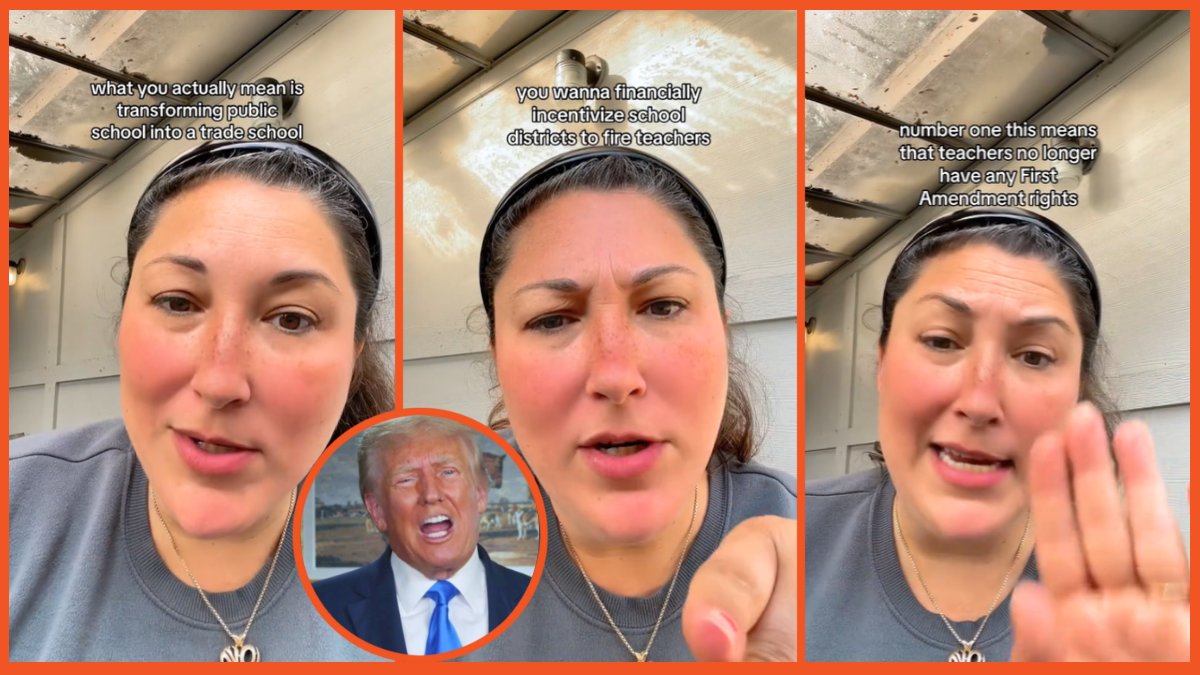During his presidential campaign, Donald Trump was not shy about condemning the American education system, both K-12 schools and higher education, for being too left-leaning for his taste – in other words, too stimulating to critical thinking skills.
For instance, the President-elect and his running mate have expressed how they view universities as being run by “Marxist maniacs,” and Trump has notoriously pledged to dismantle the Department of Education, which, among its several functions, provides Federal aid funds to low-income K-12 schools and to serve students with disabilities. But now that his plans for the education system seem to have been greenlit by the results of the 2024 election, some teachers and school staff are voicing their reasonable concerns about what it would mean in practice.
This teacher, Teresa, who goes by Newman Music Academy on TikTok, decided to pick apart “Agenda 47 : President Trump’s Ten Principles For Great Schools Leading To Great Jobs,” which was posted on the Donald Trump campaign website in September 2023. In her 5-minute analysis, Teresa spells out some of the underlying truth about what Trump’s proposed 10-point plan means in actuality: “defund public schools and transform what’s left of it into a Christian nationalist trade school.”
Trump’s cultural agenda has no regard for the most vital aspects of education
In 2010, Martha Nussbaum wrote, “Thirsty for national profit, nations, and their systems of education, are heedlessly discarding skills that are needed to keep democracies alive.” Fourteen years later the assertion still holds true, and, if Trump’s 10-point plan becomes a reality, we may soon be witnessing an antidemocratic movement fully invade American public schools.
In his Agenda 47 video, Trump begins by expressing his concern with the indoctrination of “young people with inappropriate racial, sexual, and political material.” This is, in fact, his way of manipulating and engorging people’s intolerance for what they deem as “different,” playing with socially underpinned prejudiced associations. If one were to ask – as some have – several people who are against the teaching of Critical Race Theory, many would outspokenly state their opposition, while simultaneously being unable to define the same concept they are so ardently opposed to.
The first of his key ideas is where Teresa’s analysis begins. She immediately calls out Agenda 47 for what it is: a way to silence certified educators by giving parents free rein to dictate what ideas should and shouldn’t enter a classroom and, under his administration, we are all too aware of which ideas will most suffer censoring attempts.
Pressured by the implications of the Trump plan, teachers will have their professional expertise undermined and may fear losing their job over teaching kids, for instance, about the values of diversity, inclusivity, and equality, and the importance of protecting the rights of minorities and the most underprivileged in society. These Agenda 47 objectives, as Teresa makes clear, trample all over teachers’ First Amendment rights.
For students, these measures would widen the educational gap between the elite, and everybody else. Trump believes that children are taught how to “hate their country” in schools. Teresa defends that no teacher is doing that and, even if they were, he’d have no way to police this. But I would go further on this point: Trump’s “learning to hate their country at school” is, in reality, an education that empowers kids to critically evaluate systemic problems that still, to this day, undermine the fabric of American society – and these systemic problems are not exclusive to the U.S. Whereas, when the billionaire claims America is “at the bottom of every list” – note the vagueness and lack of evidence – when it comes to education, he makes these words sound patriotic. Criticism is only “hating the country” when it goes against what suits the Trump agenda.
Teresa’s response highlights how far removed the 45th (soon-to-be 47th) President is from the needs of all American students, and points out that an educational platform based on Trump’s aversion to changes would actually harm schools’ and teachers’ ability to educate the youth to grow into the most informed critical thinkers possible, and hinders American schoolchildren from becoming meaningfully active participants in a truly free democracy.
